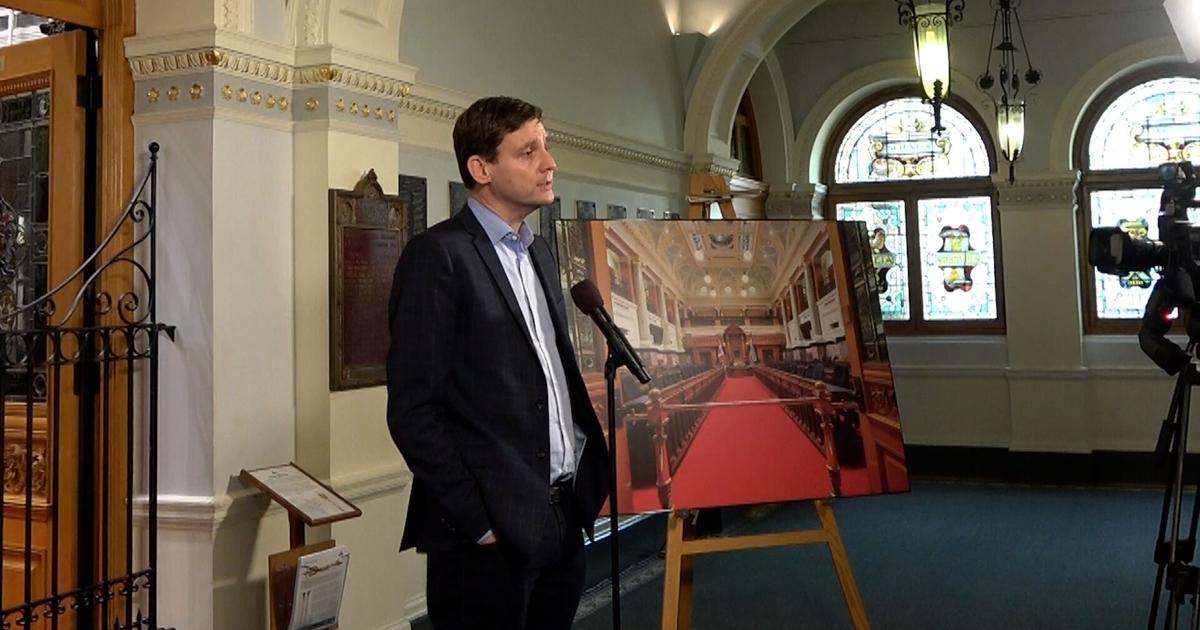News
Coronavirus: What's happening in Canada and around the world on Sunday – CBC News
The latest:
The World Health Organization said Sunday that a UN-backed program shipping coronavirus vaccines to many low-income countries has now delivered one billion doses, but that milestone “is only a reminder of the work that remains” after hoarding and stockpiling in rich countries.
A shipment of 1.1 million COVID-19 vaccine doses to Rwanda on Saturday included the billionth dose supplied via the COVAX program, the United Nations health agency said.
WHO has long criticized unequal distribution of vaccines and called for manufacturers and other countries to prioritize COVAX. It said that as of Thursday, 36 of its 194 member countries had vaccinated less than 10 per cent of their population and 88 had vaccinated less than 40 per cent.
The program has made deliveries to 144 countries so far, “but the work that has gone into this milestone is only a reminder of the work that remains,” WHO said in a statement.
“COVAX’s ambition was compromised by hoarding/stockpiling in rich countries, catastrophic outbreaks leading to borders and supply being locked. And a lack of sharing of licences, technology and know-how by pharmaceutical companies meant manufacturing capacity went unused.”
At the end of December, WHO director general Tedros Adhanom Ghebreyesus urged everyone to make a “New Year’s resolution” to get behind a campaign to vaccinate 70 per cent of countries’ populations by the beginning of July.
In a newspaper interview published Sunday, Germany’s new international development minister, Svenja Schulze, said she wants to use her country’s presidency this year of the Group of Seven industrial nations to ensure that COVAX gets the resources it needs in 2022.
Germany urges other countries to catch up
“Unfortunately, there are still too few countries participating in the financing of the global vaccination campaign,” Schulze was quoted as telling the Funke newspaper group. “Alongside Sweden, Norway, Canada and the U.S., we are the ones who are giving most. The other industrial countries have significant ground to catch up.”
Germany has said it donated 103 million doses to poorer countries last year and plans to donate another 75 million in 2022.
What’s happening across Canada
If you don’t have access to an N95 mask, or an equivalent, layering masks can be a good option — but that’s only if they’re being worn correctly. Dr. Anna Wolak, a family physician and member of Masks4Canada, breaks down the dos and don’ts of mask layering, as well as some hacks to help your masks fit better. 3:22
With lab-based testing capacity deeply strained and increasingly restricted, experts say true case counts are likely far higher than reported. Hospitalization data at the regional level is also evolving, with several provinces saying they will report figures that separate the number of people in hospital because of COVID-19 from those in hospital for another medical issue who also test positive for COVID-19.
For more information on what is happening in your community — including details on outbreaks, testing capacity and local restrictions — click through to the regional coverage below.
You can also read more from the Public Health Agency of Canada, which provides a detailed look at every region — including seven-day average test positivity rates — in its daily epidemiological updates.
In British Columbia, the 2022 B.C. Winter Games have been cancelled over COVID-19 concerns.
In the Prairies, students in Manitoba are preparing to go back to in-person schooling on Monday. The two largest universities in Alberta are delaying a return to in-person classes until late February. In Saskatchewan, an epidemiologist is countering a claim made by the province’s premier that restrictions don’t curb the spread of Omicron.
Mostly unvaccinated patients are overwhelming the ICU at a Sarnia, Ont., hospital and some will head home with a new perspective on COVID-19, the vaccine and life. 3:39
In Ontario, there were 579 people in hospital ICUs as a result of COVID-19 on Sunday, up by 21 people from the previous day, health officials said.
In Quebec, health officials said there were 282 people undergoing treatment for COVID-19 in hospital ICUs on Sunday, up by seven from Saturday.
Students in the province are returning to classes on Monday after an extended winter break. The Quebec government has said carbon dioxide readers will be coming to classrooms this coming week to better assess the ventilation needs of schools.
In the Atlantic provinces, Nova Scotia on Sunday reported that 68 people are in hospital because of COVID-19, including 10 in intensive care. Admissions grew by 10 patients, while the ICU number remained unchanged from Saturday.
Newfoundland and Labrador confirmed the province’s 25th death related to the virus on Saturday; New Brunswick entered Level 3 of its lockdown measures — the province’s most restrictive level — on Saturday; and in Prince Edward Island, where the pandemic only made limited inroads in previous waves, officials recorded 309 new cases on Saturday.
In the North, Nunavut reported five new cases on Saturday, plus one presumptive case in the village of Naujaat, while the Yukon government is imposing stronger public health measures starting on Tuesday.
What’s happening around the world
As of Sunday, roughly 326.6 million cases had been reported worldwide, according to Johns Hopkins University’s coronavirus tracker. The reported global death toll stood at more than 5.5 million.
In Asia, state media are reporting the Chinese city of Xi’an has gradually begun lifting restrictions after more than three weeks of lockdown as authorities sought to stamp out a local outbreak.
They report that lockdown measures have been either partially or completely lifted in some communities designated as lower risk, allowing people to leave their homes for a limited time to purchase daily necessities.

The partial lifting of measures comes after the city went into strict lockdown on Dec. 22, following a local COVID-19 outbreak that officials attributed to the Delta variant.
In Europe, Austria’s government proposed on Sunday setting the minimum age for mandatory vaccinations against COVID-19 at 18 and rolling out the program in stages from Feb. 1, seeking to build broad consensus for the disputed step.
The conservative-led government had said last month it intended the mandate to apply to all people aged 14 and up, which would make it the first European Union country to make vaccinations compulsory for the general population.
The federal government says all truck drivers crossing into Canada must be fully vaccinated against COVID-19, regardless of nationality, effective Saturday. Trucking associations on both sides of the border say that policy could hurt already strained supply chains by taking even more drivers out of circulation. 2:00
Denmark has lifted a number of COVID-19 restrictions and allowed the reopening of certain venues despite the spread of the Omicron variant in the country.
Cinemas, zoos, museums and theatres were among the places that could open their doors on Sunday. Limited numbers of spectators were allowed to attend indoor and outdoor sports events.
Visitors are required to wear masks at most of these places and provide proof that they have been vaccinated or have recovered or recently tested negative for COVID-19. The government is planning to relax coronavirus restrictions further in Denmark on Jan. 31.
In the Middle East, cases of COVID-19 in Saudi Arabia remain high after the kingdom recorded its highest daily number of infections last week, Health Ministry data showed, breaking through 5,000 cases. An additional 5,281 new infections were reported on Saturday, bringing the total number of cases to 609,953 since 2020.
News
Toronto Sceptres open camp ahead of second PWHL season |

The Toronto Sceptres have opened training camp for the upcoming PWHL season, with a new logo, new colours, new jerseys and a new primary venue in Coca-Cola Coliseum. The team has a lot to look ahead to after a busy off-season and successful inaugural campaign. (Nov. 12, 2024)
News
Major shakeup at Canada Soccer in wake of drone-spying scandal |

After a lengthy independent report on the Summer Olympic drone-spying scandal, Canada Soccer says women’s head coach Bev Priestman, assistant coach Jasmine Mander and analyst Joey Lombardi will not be back with the organization. It found the “practice of conducting surreptitious surveillance of opponents” predated this summer’s Paris Olympics. Former coach John Herdman has yet to give evidence. (Nov. 12, 2024)
News
Eby pays tribute to former B.C. premier John Horgan |

B.C. Premier David Eby says John Horgan was an inspirational leader who guided the province’s New Democrats out of the political wilderness after 16 years in Opposition. Eby says his predecessor as premier, who has died after a third bout with cancer, was known for his compassion for people from all walks of life but also his sharp tongue. (Nov. 12, 2024)
-

 News17 hours ago
News17 hours agoAs Toronto enters its Taylor Swift era, experts say crowd safety depends on planning
-

 News16 hours ago
News16 hours agoCanadanewsmedia news November 12, 2024: Union serves strike notice to Canada Post
-

 News16 hours ago
News16 hours agoFormer CFL commissioner Mark Cohon joins Northern Super League as board chair
-

 News16 hours ago
News16 hours agoWaymo’s robotaxis now open to anyone who wants a driverless ride in Los Angeles
-

 News17 hours ago
News17 hours agoFederal government moves to end port strikes, orders binding arbitration
-

 News16 hours ago
News16 hours agoToronto play ‘The Bidding War’ taps into city’s real estate anxiety
-

 Business16 hours ago
Business16 hours agoTrump campaign promises unlikely to harm entrepreneurship: Shopify CFO
-

 News16 hours ago
News16 hours agoWorld’s largest active volcano Mauna Loa showed telltale warning signs before erupting in 2022

























